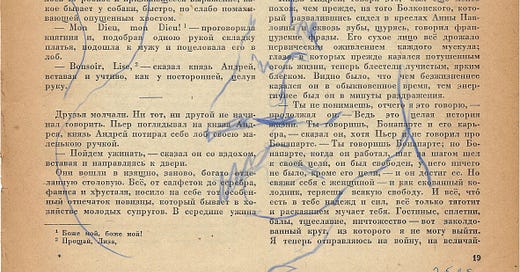“Tolstoy and I. 2-5-25” conte pencil on pages of a 1937 edition of War and Peace, 10 x 7.75 inches.
Tonight will be the second session of the reading group I moderate for ecoartspace, “Fiction as Resistance,” I have requested of the group, that they find passages they care to share from Octavia Butler’s, “The Parable of the Sower.” The book has gotten a lot of recent attention for its prescience.
As they idenitify resonant passages, I’ve asked that they please consider the parallels they may see between the fictional narrative set in our present and our actual present and try to identify where Butler erected signposts to a more positive future. The book repeatedly asserts that, “God is change,” which is ianother way of saying adaptation is a strategy. Strategy is a system that doesn't depend on individuals.
Leo Tolstoy’s entire life was motivated by the idea that it is systems not individuals that move world history. We know how true that is biologically when species are under threat.
The protagonist of Butler’s book is a young African American name Lauren, described as an empath, coping with life in a failed state. I asked our readers, “How does Lauren develop and implement her strategy to adapt and survive the conditions described in the book? What might the systemic implications be that she is an empath? Can we identify the strategies Butler suggests to survive our own stressful present?” I ask myself all the same questions





Such a powerful reflection, Aviva. The link between Tolstoy, Butler, and systemic change is striking, and your focus on empathy as a strategic force really resonates. Thank you
I read Octavia’s book years ago. I’m going to see if my library has it. Yes to Maria.
Linda